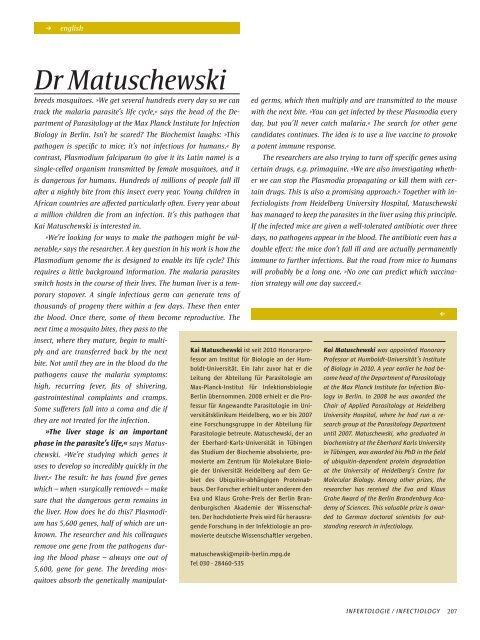hu wissen (pdf) - Exzellenzinitiative - Humboldt-Universität zu Berlin
hu wissen (pdf) - Exzellenzinitiative - Humboldt-Universität zu Berlin
hu wissen (pdf) - Exzellenzinitiative - Humboldt-Universität zu Berlin
Erfolgreiche ePaper selbst erstellen
Machen Sie aus Ihren PDF Publikationen ein blätterbares Flipbook mit unserer einzigartigen Google optimierten e-Paper Software.
k english<br />
Dr Matuschewski<br />
breeds mosquitoes. »We get several <strong>hu</strong>ndreds every day so we can<br />
track the malaria parasite’s life cycle,« says the head of the Deed<br />
germs, which then multiply and are transmitted to the mouse<br />
with the next bite. »You can get infected by these Plasmodia every<br />
partment of Parasitology at the Max Planck Institute for Infection day, but you’ll never catch malaria.« The search for other gene<br />
Biology in <strong>Berlin</strong>. Isn’t he scared? The Biochemist laughs: »This candidates continues. The idea is to use a live vaccine to provoke<br />
pathogen is specifi c to mice; it’s not infectious for <strong>hu</strong>mans.« By a potent immune response.<br />
contrast, Plasmodium falciparum (to give it its Latin name) is a The researchers are also trying to turn off specifi c genes using<br />
single-celled organism transmitted by female mosquitoes, and it certain drugs, e.g. primaquine. »We are also investigating wheth-<br />
is dangerous for <strong>hu</strong>mans. Hundreds of millions of people fall ill er we can stop the Plasmodia propagating or kill them with cer-<br />
a� er a nightly bite from this insect every year. Young children in tain drugs. This is also a promising approach.« Together with in-<br />
African countries are aff ected particularly o� en. Every year about fectiologists from Heidelberg University Hospital, Matuschewski<br />
a million children die from an infection. It’s this pathogen that has managed to keep the parasites in the liver using this principle.<br />
Kai Matuschewski is interested in.<br />
If the infected mice are given a well-tolerated antibiotic over three<br />
»We’re looking for ways to make the pathogen might be vul- days, no pathogens appear in the blood. The antibiotic even has a<br />
nerable,« says the researcher. A key question in his work is how the double eff ect: the mice don’t fall ill and are actually permanently<br />
Plasmodium genome the is designed to enable its life cycle? This immune to further infections. But the road from mice to <strong>hu</strong>mans<br />
requires a little background information. The malaria parasites will probably be a long one. »No one can predict which vaccina-<br />
switch hosts in the course of their lives. The <strong>hu</strong>man liver is a temporary<br />
stopover. A single infectious germ can generate tens of<br />
thousands of progeny there within a few days. These then enter<br />
tion strategy will one day succeed.«<br />
the blood. Once there, some of them become reproductive. The<br />
next time a mosquito bites, they pass to the<br />
insect, where they mature, begin to multi-<br />
v<br />
ply and are transferred back by the next Kai Matuschewski ist seit 2010 Honorarpro- Kai Matuschewski was appointed Honorary<br />
bite. Not until they are in the blood do the<br />
pathogens cause the malaria symptoms:<br />
fessor am Institut für Biologie an der <strong>Humboldt</strong>-<strong>Universität</strong>.<br />
Ein Jahr <strong>zu</strong>vor hat er die<br />
Leitung der Abteilung für Parasitologie am<br />
Professor at <strong>Humboldt</strong>-<strong>Universität</strong>’s Institute<br />
of Biology in 2010. A year earlier he had become<br />
head of the Department of Parasitology<br />
high, recurring fever, fi ts of shivering, Max-Planck-Institut für Infektionsbiologie at the Max Planck Institute for Infection Bio-<br />
gastrointestinal complaints and cramps. <strong>Berlin</strong> übernommen. 2008 erhielt er die Prology in <strong>Berlin</strong>. In 2008 he was awarded the<br />
Some suff erers fall into a coma and die if<br />
they are not treated for the infection.<br />
fessur für Angewandte Parasitologie im <strong>Universität</strong>sklinikum<br />
Heidelberg, wo er bis 2007<br />
eine Forsc<strong>hu</strong>ngsgruppe in der Abteilung für<br />
Chair of Applied Parasitology at Heidelberg<br />
University Hospital, where he had run a research<br />
group at the Parasitology Department<br />
»The liver stage is an important Parasitologie betreute. Matuschewski, der an until 2007. Matuschewski, who graduated in<br />
phase in the parasite’s life,« says Matus- der Eberhard-Karls-<strong>Universität</strong> in Tübingen biochemistry at the Eberhard Karls University<br />
chewski. »We’re studying which genes it das Studium der Biochemie absolvierte, pro- in Tübingen, was awarded his PhD in the fi eld<br />
uses to develop so incredibly quickly in the<br />
liver.« The result: he has found fi ve genes<br />
movierte am Zentrum für Molekulare Biologie<br />
der <strong>Universität</strong> Heidelberg auf dem Gebiet<br />
des Ubiquitin-abhängigen Proteinab-<br />
of ubiquitin-dependent protein degradation<br />
at the University of Heidelberg’s Centre for<br />
Molecular Biology. Among other prizes, the<br />
which – when »surgically removed« – make baus. Der Forscher erhielt unter anderem den researcher has received the Eva and Klaus<br />
sure that the dangerous germ remains in Eva und Klaus Grohe-Preis der <strong>Berlin</strong> Bran- Grohe Award of the <strong>Berlin</strong> Brandenburg Aca-<br />
the liver. How does he do this? Plasmodium<br />
has 5,600 genes, half of which are undenburgischen<br />
Akademie der Wissenschaften.<br />
Der hochdotierte Preis wird für herausragende<br />
Forsc<strong>hu</strong>ng in der Infektiologie an prodemy<br />
of Sciences. This valuable prize is awarded<br />
to German doctoral scientists for outstanding<br />
research in infectiology.<br />
known. The researcher and his colleagues<br />
remove one gene from the pathogens durmovierte<br />
deutsche Wissenscha� ler vergeben.<br />
ing the blood phase – always one out of<br />
5,600, gene for gene. The breeding mosquitoes<br />
absorb the genetically manipulat-<br />
matuschewski@mpiib-berlin.mpg.de<br />
Tel 030 · 28460-535<br />
INFEKTOLOGIE / INFECTIOLOGY<br />
207



